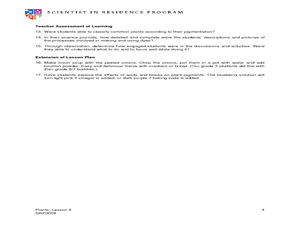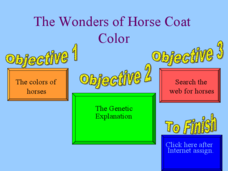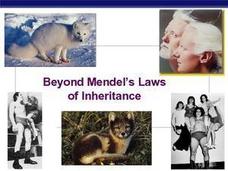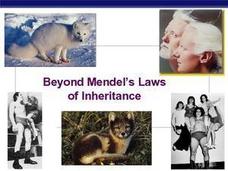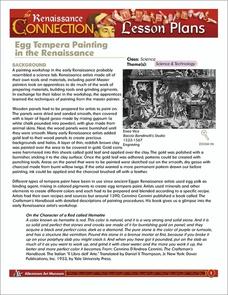Howard Hughes Medical Institute
Human Skin Color: Evidence for Selection
Skin color is controlled by at least six genes. Young scientists learn about skin colors through a documentary. They discuss the topics of pigment, natural selection, and vitamin D absorption. They apply their knowledge to higher order...
Curated OER
Skin
In this skin learning exercise, 9th graders list the five main functions of the skin. Then they explain why a runner sweats and how many sweat glands there are in the body. Students also describe what occurs when the epidermis is...
Curated OER
Using Plant Pigments as Natural Dyes
Young scholars create friendship bracelets and quilt squares. In this plant lesson plan student dye their own string and cotton material with plant pigments. Students use the naturally dyed materials to create the friendship bracelets...
Royal Society of Chemistry
Lead Compounds: Precipitation Reactions and Pigments—Microscale Chemistry
Colorful lead compounds never fail to impress! Solubility scholars examine a series of double replacement reactions involving lead nitrate and record their observations. The second part of the experiment illustrates the differences...
American Chemical Society
Isolation of Phytochrome
Why do soybean plants that are planted weeks apart in the spring mature simultaneously in the fall? Four independent activities cover the history of phytochrome research, scientist collaboration, the electromagnetic spectrum, and...
Curated OER
The Wonders of Horse Coat Color
You won't be able to use a few of the slides in this presentation since the first lists objectives not met within, and the third gives instructions to a worksheet that is not included. You will, however, find the remaining slides useful...
Pleasant Valley Community School District
Integumentary System
This document can be used as a slide show to introduce your human body systems class to the integumentary system, also know as skin. Topics outlined include the roles of skin, details about its its layers, and color (cause and...
Reed Novel Studies
Freckle Juice: Novel Study
Is the grass always greener on the other side? Andrew from Freckle Juice seems to think so! He admires his classmate's freckles and wishes he had some of his own, so he purchases a special juice to get them! While reading through the...
Curated OER
Natural Dye Lesson Plan
Students investigate major pigments which occur naturally in fruits and vegetables, and to use them to dye a number of items. They study the effects of pH on anthocyanin on pigments.
Curated OER
Protection, Support, and Locomotion
In this human body worksheet, students will review 5 terms associated with the skin by filling in the blank. Then students will read 14 statements about the human skeleton and muscles and determine if its true or false.
Curated OER
Learning Activities: What Color Am I?
Students identify various species of anurans by their skin coloration. They describe how coloration contributes to survival.
Curated OER
Dragon Genetics - Understanding Inheritance
Six pages begin with a detailed introduction to meiosis and homologous chromosome pairs. Instructions guide learners through a simulation in which they draw craft sticks marked with autosomes in order to decode the genes inherited by...
Curated OER
Genetics Practice 1: Basic Mendelian Genetics
Six genetics problems are to be solved by junior geneticists. Empty Punnett squares are provided for them to plant the parents' alleles and determine the genotype, phenotype, and frequency of offspring. All of the problems involve actual...
Curated OER
Beyond Mendel's Laws of Inheritance
Mendels laws of Genetics are extended here with examples of traits that are completely controlled by just one gene. Malfunctions such as albinism and baldness can therefore be tracked and will demonstrate inheritance patterns to your...
Curated OER
Beyond Mendel's Laws of Inheritance
This PowerPoint jumps right into the details of unusual traits and how they are coded. The epistasis patterns in Labradors are used as a main example, and many instances of polygenic inheritance malfunctions are explained. All of...
Serendip
Genetics
A handout on genetic inheritance begins with a reading on alleles and how they can result in albinism. Junior geneticists learn to complete Punnett squares and participate in a coin toss simulation of allele pairing. They also learn...
American Museum of Natural History
Crazy Camouflage
Scholars discover the crazy camouflage technique of the flounder fish. After reading three informative paragraphs, participants follow steps to make a model of the sea creature.
Curated OER
Quiz: Dinosaurs
In this science worksheet, 3rd graders will respond to questions pertaining to dinosaurs. Students will answer ten questions consisting of true/false, and multiple choice.
Curated OER
Octopus Project: Ceramics
Kids make an octopus out of clay. They practice their sculpting and modeling skills such as pinch pot and slurry technique while sculpting an octopus.
Curated OER
Plants and Animals Crossword Puzzle
In this science worksheet, middle schoolers look for the answers to the questions to fill in the crossword puzzle using the theme of pants or animals.
Curated OER
Albinistic Animals Are Awesome
Are all academicians allured with alliteration? Use this cross-curricular online resource to simultaneously expose your scholars to parts of speech and the genetic mutation causing albinism. Initial context gives students an introduction...
Curated OER
King Cotton
Fifth graders examine the manufacturing of cotton. In this cotton and slavery lesson, 5th graders review background information about cotton and slavery. Students examine a real cotton ball and discuss why it was painful to pick....
Curated OER
Egg Tempera Painting In The Renaissance
Students explore the development of paint and paintings during the Renaissance. In a science lab, they reproduce the properties of egg in tempera paint and compare and contrast egg tempera paintings to oil paintings. Through...
Curated OER
Foiling Spoilage
In this agricultural education worksheet, students read 6 descriptions of bacteria that cause food spoilage. Students then read 4 descriptions of preservatives that can be used to prevent spoilage. The worksheet is meant as a...




